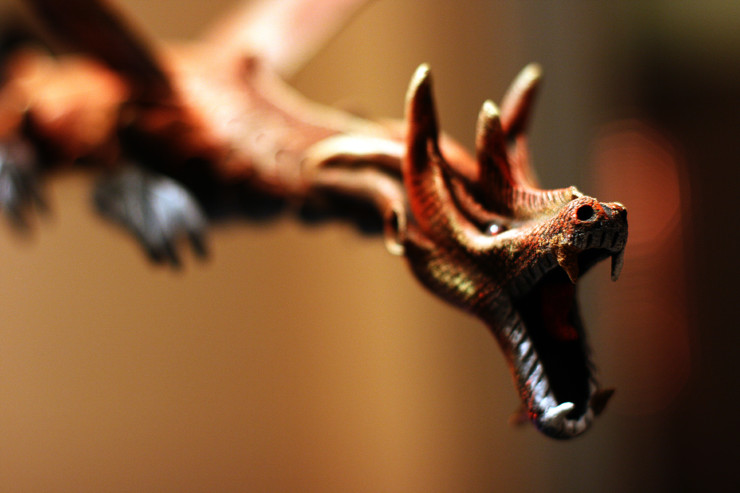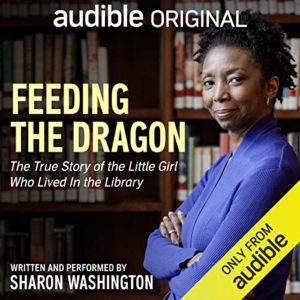In 2020, Tweetspeak is exploring the theme of wisdom, using William Stafford’s poem A Ritual to Read to Each Other as our guide. I’ve been thinking about what it means to be “read to,” not just to read.
It was about the time we moved into this house, three years ago, that I started getting into audiobooks. That was, come to think of it, about the time we became empty-nesters, and so there was no one to read aloud to. So I found ways for people to read aloud to me.
Often I choose an audiobook version of a classic, because professionals read even long Jane Austen sentences with spunk. I choose them if the book has a lot of foreign words, like Kristin Lavransdatter, since Kristin was the only Norwegian name I could pronounce without assistance. Sometimes a book has multiple voices, like Daisy Jones and The Six, and sounds better with a cast. In the case of Feeding the Dragon, I bought the audiobook because the story was originally a one-woman play, written and performed by Sharon Washington, and I wanted to hear her do it justice.
The teaser proved to me this was an actor who would bring fullness and nuance my brain would never conjure up on its own.
I bought the audiobook at the end of January, and looking back, it was probably being promoted in anticipation of February’s Black History Month. But that wasn’t why I bought it. I bought it for the subtitle: “The True Story of the Little Girl Who Lived in the Library.”
Once upon a time, there was a little girl who lived in a library.”
That is how the story begins. And because of that great hook, I’ll probably always think that is the title; but it’s Feeding the Dragon. The little girl and the library are not the most important things in the story — the dragon is.
The dragon has more than one meaning. There’s a literal one that Washington understands as a child. There’s a metaphorical one she understands when she gets a little older. And there is a great big fire-breathing symbolic one she grasps as an adult, looking back on all that happened. In this story we are led through them all.
Washington wanted to write a children’s book about her growing up, sort of a modern fairytale, but the story wouldn’t let her. In fairytales, dragons are defeated. This one isn’t — not on any level. And yet the story is uplifting. The family does not live happily ever after, but they do have happiness. The fact that this story can be told at all is proof that it is worth telling in this way.
I listened to the 1 hour and 17 minute audiobook on my morning walk with the dogs. It took several days because I’d stop and think about my own life’s story and how it might be told. I’d rewind to hear certain parts of Washington’s story again. I wanted to see how the end connected to the beginning, so as soon as she finished reading aloud to me, I pushed play and started over.
That is one of the gifts of audiobooks: I take more time with them. I’m a fast reader — often too fast — but when I listen, I slow down to the speed of the voice reading aloud to me. I often stop the recording before my walk ends and let my mind wander. I think about the story and wonder where it might be going. I notice patterns. Sometimes I pause at a great line, and when I get home, I rewind and write it down. The audiobooks get tangled up in my walks, or sometimes, in my bike rides, so that I know exactly where I was when I heard what became my favorite part in a particular story.
For Feeding the Dragon, I made a loop that passed the middle school, the town pool, and the back streets my children explored without me. There is much I do not understand about their growing up, but having a voice read aloud to me in the quiet dark made me think about what metaphor might hold our story and what format might be a suitable container to tell it.
February Pages
Finished
Poetry
Poems About Trees, edited by Harry Thomas (Best airport bookstore purchase ever.)
Adult
The Yellow Wall-Paper: a graphic novel, Charlotte Perkins Gilman, illus. Sara Barkat (New from Tweetspeak! Book Club begins April 8.)
They Called Us Enemy, a graphic novel by George Takei with Justin Eisinger and Steven Scott, illus. by Harmony Becker (A memoir exploring the four years the actor and his family were forced into internment camps in the United States during WW2.)
Gaudy Night: A Lord Peter Wimsey Mystery with Harriet Vane, Dorothy Sayers
Feeding the Dragon, Sharon Washington
Early Readers and Picture Books
Raven and River, Nancy White Carlstrom, illus. Jon Van Zyle
The Big Storm, Bruce Hiscock
The Secret Life of the Skunk, by Laurence Pringle, illus. Kate Garchinsky
Middle Grade and YA
Bellweather Rhapsody, by Kate Racculia (Not purely YA, but neither is The Westing Game, which Racculia calls an inspiration for this story.)
Riding Freedom, Pam Munoz Ryan, illus. Brian Selznick
The Cricket in Times Square, George Selden, illus. Garth Williams (Join us Friday, March 13, for Children’s Book Club!)
Made Progress
Little Women, Louisa May Alcott (I’ve finished the first half, which was originally published as Little Women. Part 2 is sometimes titled Good Wives.)
Abandoned
Robinson Crusoe, Daniel Defoe
Your turn
1. Do you have someone to read to?
2. What books have you especially enjoyed in an audio format?
3. Share your February pages. Sliced, started, and abandoned are all fair game.
Photo by José Carlos Cortizo Pérez, Creative Commons, via Flickr. Post by Megan Willome.
Browse more from A Ritual to Read to Each Other
Browse more Children’s Book Club
https://www.tweetspeakpoetry.com/?s=children%27s+book+club
Browse more By Heart https://www.tweetspeakpoetry.com/?s=by+heart
“Megan Willome’s The Joy of Poetry is not a long book, but it took me longer to read than I expected, because I kept stopping to savor poems and passages, to make note of books mentioned, and to compare Willome’s journey into poetry to my own. The book is many things. An unpretentious, funny, and poignant memoir. A defense of poetry, a response to literature that has touched her life, and a manual on how to write poetry. It’s also the story of a daughter who loses her mother to cancer. The author links these things into a narrative much like that of a novel. I loved this book. As soon as I finished, I began reading it again.”
—David Lee Garrison, author of Playing Bach in the D. C. Metro
- Perspective: The Two, The Only: Calvin and Hobbes - December 16, 2022
- Children’s Book Club: A Very Haunted Christmas - December 9, 2022
- By Heart: ‘The night is darkening round me’ by Emily Brontë - December 2, 2022



Glynn says
I read to my grandsons at any opportunity, although the two oldest are reading on their own and not as willing to sit still and listen. And – this may be shocking – I don’t listen to audio books. I do occasionally listen to lectures if I’m driving a long distance. But I’ve never been attracted to audio books.
February Reading
Mysteries
The Silent Ones by William Brodrick
The Brief by Simon Michael
A Fateful Act by Jonathan Dunsky
The Shipping Murder by Roy Lewis
Fiction
That Hollister Man by Margaret Desmond
The House of Seven Gables by Nathaniel Hawthorne
Romancing the Conflicted Cowboy by Crystal Walton
Wrangled by the Watchful Cowboy by Tamie Dearen
Inspired by the Creative Cowboy by Bree Livingston
Peace in the Valley by Ruth Logan Herne
Teaghan: Cowboy Strong by Kathleen Ball
Cowboys & Firelight by Jacqueline Winters
Cowboys & Starlight by Jacqueline Winters
(No. I’m not reliving my childhood with cowboys; it’s for a series on cowboys and romance.)
Poetry
Acacia Road by Aaron Brown
Desert Tracings: Six Classic Arabian Odes, translated by Michael Sells
Pillar of Fire by Oscar Truitt
Non-fiction
William Wilberforce by Kevin Belmonte
Megan Willome says
I am learning there are two categories of people: those who passionately love audiobooks and those who do not. I have friends in both categories.
By the way, this was my first Dorothy Sayers book and therefore the first encounter with Lord Peter Wimsey and Harriet Vane. I enjoyed it so much I may look for an audio version. The insight into human nature, especially in the world of academia, was superb.
Will Willingham says
My eldest sent me a list of his February books the other day. It made me happy, as it was quite long, and since being in grad school he has found it harder and harder to read for leisure since he spends so much of his day reading for study or for his work as a GA. I expressed a bit of jealousy (maybe it was more than a bit) and he said he credits the audiobooks. He’s listening on his walks, his bus rides, his longer car trips. I’m impressed.
I haven’t quite mastered the art of audiobook listening (I do think it’s a skill, yes?). But I’m working on it. I have the opposite challenge you noted here – I listen too fast, and miss things as my brain wanders off or I start to multi-task. But when it works for me, when I actually enter into the listening well, it’s such a rewarding time.
Megan Willome says
Will, I’ve found that to not have my brain wander too much, I need to listen on a walk. Since my walks are in the dark, that makes it all the easier to concentrate.
Happy to hear your son has a great big reading list and is accessing those in multiple ways. One of my children definitely prefers audiobooks, and the other prefers paper. Neither likes ebooks.
Kortney Garrison says
I *do* have people to read aloud to–three in fact. And sometimes a cat. We are almost finished with On the Banks of Plum Creek. Pa is caught in a blizzard, and Ma is keeping watch with the lamp lit in the window.
I too just finished Little Women–the second half is so much more interesting than the first. Just beginning Little Men.
And Gaudy Night is my absolute favorite Sayers. Though I’d read any of the Harriet Vane stories any day! I love the idea of finding it on audio. It’s on my list to listen to a V Woolf novel this year…
Peace keep you, Megan!
Megan Willome says
Kortney, you’ve got such a great list there!
You know, I have not read any Virginia Woolf in a long time. She’s worth revisiting. I remember not liking “To The Lighthouse” when I first read it, and then after I’d been married a couple of decades, I thought it was brilliant.